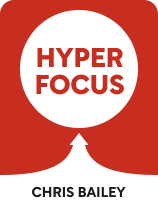

This article is an excerpt from the Shortform book guide to "Hyperfocus" by Chris Bailey. Shortform has the world's best summaries and analyses of books you should be reading.
Like this article? Sign up for a free trial here .
What is quality information? How can you be more intentional about the quality of the information you consume?
We’re bombarded with information and stimuli. The information you allow into your brain impacts your creativity and, ultimately, your productivity. You can increase the quality of information you take in by asking yourself five particular questions before you consume any information.
Read more to learn how to find higher-quality information.
Why Having the Right Stimuli Is Essential
Creativity depends on the information you encounter. In other words, the higher-quality bits and chunks you create in your mind, the higher-quality ideas you have.
So how do you get the highest-quality bits? Since our brains can store nearly limitless amounts of information, you could try cramming as much information into your head as possible. However, as we’ve seen, you can only pay attention to a limited number of items simultaneously due to your limited working memory capacity. So even if you tried to pay attention to all the world’s information, you would only capture a certain amount—and not necessarily the data that was most beneficial to you. Furthermore, trying to pay attention to more items than your working memory is capable of holding overwhelms your brain and causes you to forget important information.
(Shortform note: Another problem with paying attention to all of the data has to do with information overload. Smarter Faster Better describes how in our modern society, many of us become so overwhelmed by the amount of data available that we enter a state of “information blindness,” where we either ignore the data, misinterpret the data, or stop taking it in altogether. Author Charles Duhigg explains that you avoid information overload by interacting with the data in some way, such as by writing it out, plotting it on a graph, or explaining it to another person.)
Instead, Chris Bailey argues, to get the highest-quality bits, you need to pay attention to the highest-quality information.
Bailey goes so far as to argue that paying attention to the right information is what causes genius. People often cite that geniuses are made by 10,000 hours of practice. But in order to come up with genius ideas and decisions, Bailey argues, you must connect 10,000 hours’ worth of information. (Shortform note: The 10,000-hour rule was popularized by Malcolm Gladwell in Outliers, but this is actually a myth. One reason for this is that he doesn’t distinguish between different types of practice. As Peak explains, not all practice is equal: deliberate practice, which involves setting clear goals and making specific improvements, is the best type.)
How to Get the Most Beneficial Information
So, what is quality information? How do you get it?
First, you must determine what counts as quality information. Bailey posits that all the information we encounter can be ranked based on its usefulness and its entertainment value. The most useful (and thus highest-quality) information is accurate, related to your goals, practical, and relevant long-term. Bailey suggests that we encounter this mostly in books and podcasts. (Shortform note: Although this is a generally applicable rule, rating the value of information is an extremely subjective process. If you personally find a piece of information useful, that’s enough. Don’t feel like information that doesn’t meet all of these criteria can’t be useful.) However, the most useful information also takes the most work to learn—so it’s also the least entertaining. According to Bailey, generally speaking, the less useful the information, the more entertaining it becomes.
Then, improve the quality of the information that you take in. Bailey doesn’t suggest exclusively taking in high-quality information. Fun is important, and given how much work it is to learn useful information, taking in only high-quality information would be exhausting. (Shortform note: Lower-quality information has benefits other than fun, too. For example, watching TV can help you relax if you’re facing a major stressor.)
Rather, Bailey recommends that you be more intentional about the information you do take in. So we recommend trying this experiment: Over the next few weeks, ask yourself the following questions before you consume any information. Doing so will teach you to be more intentional about the information you consume so that you can consume higher-quality information.
Question #1: Do I enjoy this?
Bailey explains that sometimes, we consume information out of habit and not because we genuinely enjoy it. Stop doing this. (Shortform note: If you struggle with this, try Chapter 4’s strategies for reducing distractions to help cull the information you consume.) Conversely, most of us enjoy something that others don’t. Bailey encourages you to keep doing this, even if others find it strange or unappealing. (Shortform note: If you struggle to enjoy things that you like but other people don’t, it may be a signal to be kinder to yourself. Try strategies like complimenting yourself—doing so boosts your endorphins and spurs you to accomplish more.)
Question #2: Is this worth finishing?
Have you ever powered through a book you hated just because you wanted to finish it? Bailey explains that this is due to the Zeigarnik effect—your mind doesn’t like leaving things unfinished. (We’ll elaborate more on this later.) Give yourself permission to walk away from information that is ultimately not valuable.
(Shortform note: What if you don’t want to read the whole book but are still curious about what happens? In this case, simply Google the title of the media you’re consuming and spoiler. You’ll satisfy your curiosity without spending all the time to finish everything.)
Question #3: Is this worth my time, focus, and energy?
Bailey argues that too many of us select the media we consume based on others’ recommendations and not because we actually want to. So he encourages you to vet any media you’re considering consuming by asking this question. (Shortform note: Bailey first introduces this idea in Chapter 0.5 by telling his reader to re-evaluate whether or not they really want to read Hyperfocus. This is unique in works about productivity and demonstrates Bailey’s commitment to his mission: Most books don’t encourage you to reconsider whether you want to read them after you’ve already picked them up.)
If you can’t decide between multiple options, imagine yourself looking back on your life. Which activity would your future self think was a better use of your time? Would your future self have any regrets about how you spent this time? (Shortform note Imagining your life from the perspective of your future self can help you determine more than what piece of information to consume—it can clarify your goals for the future. One common technique is to write your own obituary so that you think about the impact you want to leave and whether your current actions support that.)
Question #4: Is this related to what I know already?
Bailey explains that you gain the most creative insights when you connect the ideas that are the most different. So venturing outside your comfort zone and learning new things is key to gaining more creative insights. (Shortform note: This is true of both topics and creators. In 2020, many Americans deliberately diversified the media that they consumed—not by topic but by consuming more media created by BIPOC.)
That said, expertise comes from collecting as much information about a topic as possible. So when you stop consuming something, he recommends consuming something new—ideally, something related to your field of expertise. (Shortform note: Given that one of Bailey’s major ideas is that we are generally overstimulated, this recommendation seems counterintuitive. It may be worth eliminating poor-quality sources of information and not replacing them to get used to less stimulation overall.)
Question #5: Do I want to do this?
Since Bailey defines productivity as accomplishing your intended goal, relaxation can be productive. The key? Don’t let yourself fall into autopilot mode. To accomplish this, schedule your relaxation periods in advance and stick to them. It’s OK to binge-watch a TV show as long as you decide how many episodes to binge in advance.(Shortform note: A lot of distractions like Netflix suck us into long unintended bouts of relaxation because they autoplay. Make your Netflix binge more intentional by turning off this setting—having to manually select the next episode might help you reconsider whether this Is how you really want to be spending your time. This is an example of what Atomic Habits describes as a one-time action that triggers good habits.)

———End of Preview———
Like what you just read? Read the rest of the world's best book summary and analysis of Chris Bailey's "Hyperfocus" at Shortform .
Here's what you'll find in our full Hyperfocus summary :
- Why it's just as important to learn how to manage your attention, along with your time
- Why you still feel tired no matter how many breaks you take
- Strategies for managing your attention for better productivity and creativity






